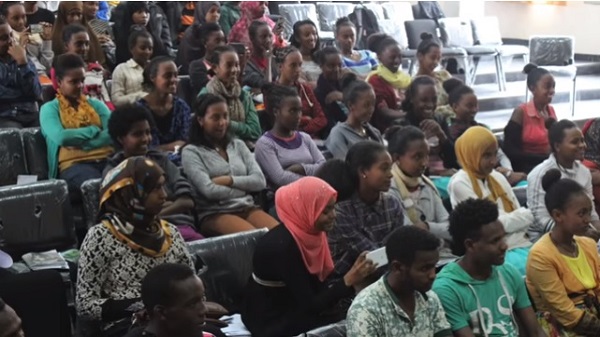
AddisCoder, a free, four-week summer program in Addis Ababa, introduces high school students from around the country to the principles of programming and algorithms.
(Harvard SEAS)–For many Ethiopian high school students seeking an interesting and rewarding career, computer science doesn’t appear on their radar.
High-achieving students in this developing nation of more than 100 million often pursue medicine or engineering, said Jelani Nelson, an Ethiopian-American and John L. Loeb Associate Professor of Engineering and Applied Sciences at the Harvard John A. Paulson School of Engineering and Applied Sciences.
The AddisCoder program, which Nelson founded in 2011, is designed to change that.
AddisCoder, a free, four-week summer program in Addis Ababa, Ethiopia’s capital, introduces high school students from around the country to the principles of programming and algorithms.
“This program is really about exposure,” said Nelson. “A lot of students in Ethiopia like math, and computer science, especially algorithms, is very mathematical. But they don’t know this field even exists. We want them to know that there are good career opportunities in computer science and the field is fun and interesting.”
Nelson launched the program after he finished grad school at MIT. He was visiting relatives in Ethiopia that summer, and wanted to use some of his vacation time to spread awareness of computer science. Nelson invited Ethiopian teens to apply by email, and he and a teaching assistant taught the course to an initial cohort of 82 students, mostly from elite private schools.
Seeking to expand the program to public school students for the second AddisCoder in 2016, he partnered with the Meles Zenawi Foundation, which sponsored room and board for the high schoolers during the program. The foundation collaborated with Ethiopia’s Ministry of Education to recruit top-performing students from across the country.
This summer, more than 170 students enrolled in the third iteration of AddisCoder, which was led by three instructors and 20 teaching assistants recruited from all over the world, including three Harvard undergraduates. More than 20 Ethiopian college students served as lab assistants.
The intensive program, held at the Addis Ababa Science and Technology University, taught students the basics of Python programming and fundamental ideas in algorithm design and analysis. The hands-on program has only one to two hours of lectures each day. Students spend the bulk of their time in the lab solving problems and writing code.
Keeping up with a lab full of energetic high schoolers kept computer science concentrator Will Finigan, A.B. ’20, on his toes.
“I had never really done any teaching before, so this was a totally new experience for me and I didn’t know what to expect,” he said. “These kids were amazing. They were so into it, we had to basically drag them out of the lab each day when it was time to leave. They just wanted to keep working, and their excitement was contagious.”
Getting students up to speed during the tough, initial lessons was challenging, heightened by the fact that some were not proficient in English, Finigan said.
Read the complete story at Harvard John A. Paulson School of Engineering and Applied Sciences
